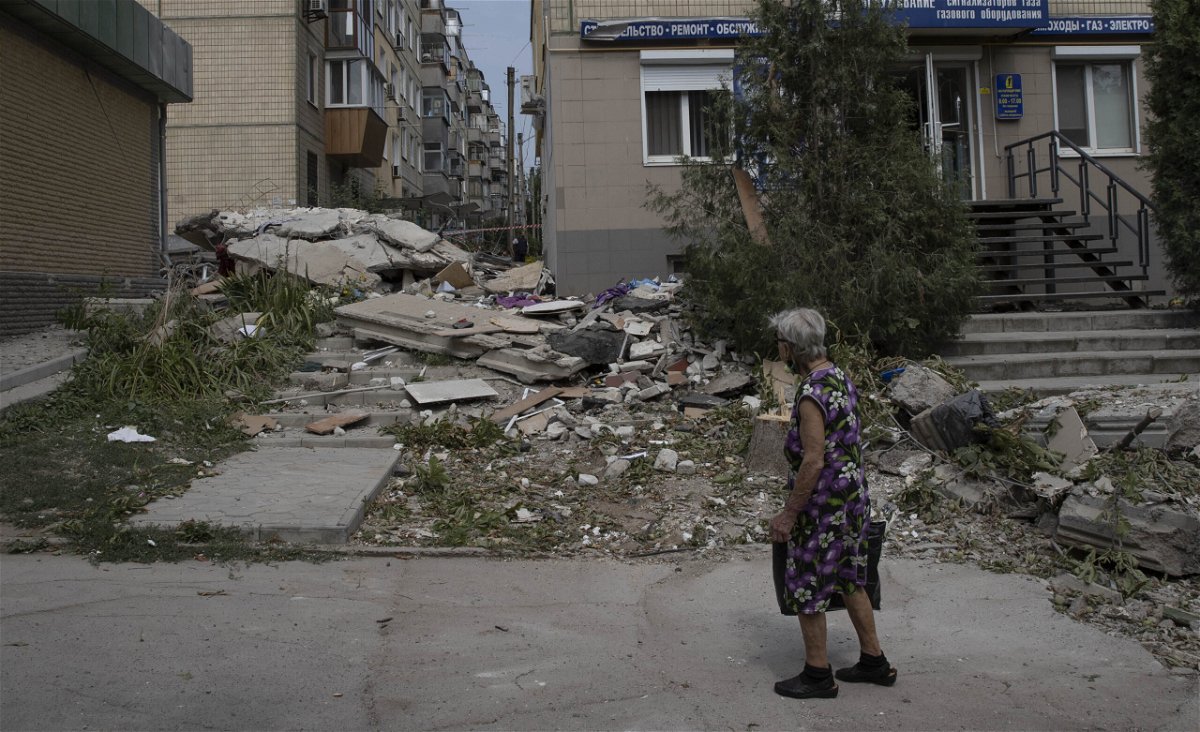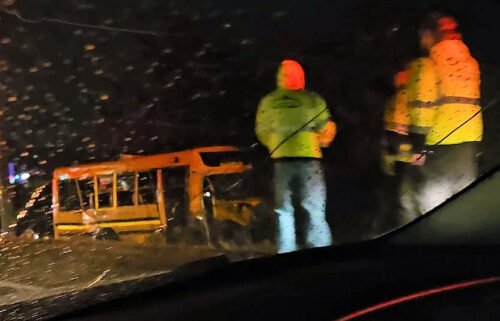Inside the Ukraine power plant raising the specter of nuclear disaster in Europe

A woman assesses the damage on a street in Nikopol
By Eliza Mackintosh and Oleksandra Ochman, CNN
Every day Olga is bused from her home in the Russian-occupied town of Enerhodar, on the banks of the Dnipro River in southeastern Ukraine, to the nearby Zaporizhzhia nuclear power plant where she works.
The plant, the largest nuclear complex of its kind in Europe, is the focal point of growing global concern after days of increased shelling have triggered calls for international experts to visit the facility and ratcheted fears of a potential nuclear accident.
Kyiv has repeatedly accused Russian forces, which seized the plant in March, of storing heavy weaponry inside the complex and using it as cover to launch attacks, knowing that Ukraine can’t return fire without risking hitting one of the plant’s six reactors — a mistake that would spell disaster. Moscow, meanwhile, has claimed Ukrainian troops are targeting the site. Both sides have tried to point the finger at the other for threatening nuclear terrorism.
For Olga and her Ukrainian colleagues still working at the plant, the specter of nuclear disaster is not just the stuff of nightmares — it is a daily reality.
It is “like sleeping and watching a dream,” she told CNN in a recent phone interview, describing the surreal, prolonged shock that she has experienced working at the plant, which though held by Russian forces, is still primarily operated by Ukrainian technicians.
In the months since the nuclear facility was captured, Ukrainian employees have slowly started to return — carrying out tasks in partly shattered rooms and only coming into contact with Russian soldiers when they cross through two checkpoints to get inside the complex.
“After the occupation, only operational personnel worked at the station. There were a lot of broken and burned rooms and windows. Then they gradually began to go ask people to come to work for specific tasks,” Olga, whose name has been changed to protect her identity, said.
“Now the part of the staff that did not leave is working. About 35 to 40% of workers left.”
The reduced staff and a flare in fighting are making working conditions increasingly tenuous.
Ukraine and Russia again traded blame after more shelling around the plant overnight on Thursday, just hours after the United Nations called on both sides to cease military activities near the power station, warning of the worst if they didn’t.
“Regrettably, instead of de-escalation, over the past several days there have been reports of further deeply worrying incidents that could, if they continue, lead to disaster,” UN secretary general, António Guterres, said in a statement. “I urge the withdrawal of any military personnel and equipment from the plant and the avoidance of any further deployment of forces or equipment to the site.”
Addressing a meeting of the UN security council in New York on Thursday, the head of the International Atomic Energy Agency (IAEA), Rafael Grossi, said that recent attacks had knocked out parts of the plant, risking an “unacceptable” potential radiation leak and called for a team of experts to urgently be allowed to access the site, where the situation “has been deteriorating very rapidly.”
“This is a serious hour, grave hour, and the IAEA must be allowed to conduct its mission in Zaporizhzhia as soon as possible,” Grossi said.
Energoatom, Ukraine’s state-run nuclear power company, accused Russian forces on Thursday of targeting a storage area for “radiation sources,” and shelling a fire department nearby the plant. A day later, the company said in a statement on its Telegram account that the plant was operating “with the risk of violating radiation and fire safety standards.”
Ukraine’s Interior Minister, Denys Monastyrskyi, said Friday that there was “no adequate control” over the plant, and Ukrainian specialists who remained there were not allowed access to some areas where they should be.
CNN is unable to confirm the details provided by Energoatom or Monastyrskyi, but Grossi has said that some parts of the plant were inoperable. Olga also confirmed that parts of the complex are inaccessible to Ukrainian staff.
Russia has continued to accuse Ukraine of being behind the attacks. A local official in the occupation’s administration, Vladimir Rogov, told Russian-state news agency Rossiya 24 channel on Friday that there was “constant damage” to the plant’s power transmission line and suggested that the complex may be “mothballed” — without any explanation as to how that might happen.
Ukrainian authorities say that Russian rockets fired from the nuclear power plant have pummeled the city of Nikopol, on the right bank of the Dnipro River, and surrounding districts over the last week. At least 13 people were killed in the shelling overnight Tuesday, and several more were injured on Wednesday and Thursday evening, including a 13-year-old girl, according to local officials.
Over the last few months, Olga said she has seen Russian military equipment arriving at the nuclear complex, though much of it has now been hidden from view. “Initially, there was equipment on the territory of the station, now there is even more of it,” she said, adding that employees are not allowed in the areas where it is being stored.
But when she returns home from work, Russia’s firepower is clear, she said. “Horrors happen at night, they are f**king shelling the city.
“The incoming hit on the right bank (of the river) rattles so much that the houses shake and the windows tremble. It’s creepy in the silence of the night when people are sleeping,” she added.
Across the Dnipro, in Nikopol, the attacks now feel relentless.
From the window of her home near the city’s port, Oksana Miraevska can look across the water and see the volley of incoming shells.
“If something happens with the power plant, some accident … I can’t think about that. Do you think something could help us? We are 7 kilometers from the nuclear power plant across the river! Nothing will save us, I’m sure,” Miraevska, a 45-year-old small business owner, told CNN in a phone call.
“That’s why I don’t even entertain that thought.”
When the shelling flared last month, Miraevska said many residents fled in panic, but she stayed behind trying to help locally, mostly taking in abandoned pets. At night, she and her teenage son take the animals downstairs to their basement-turned-bomb shelter, where they all sleep.
“When they started shelling us, then in general life changed. I live in the basement, we go there for the night. We have been sleeping there for a month now,” Miraevska said.
“I don’t think the enemy should be underestimated,” she added.
It’s the same message being echoed by international experts warning of the disastrous impact one errant shell could cause.
Last weekend, shellfire damaged a dry storage facility — where casks of spent nuclear fuel are kept at the plant — as well as radiation monitoring detectors, making detection of any potential leak impossible, according to Energoatom. Attacks also damaged a high-voltage power line and forced one of the plant’s reactors to stop operating.
That uptick in shelling pushed the IAEA to intensify its efforts to send an expert mission to visit the plant to assess and safeguard the complex.
While an initial assessment by experts found “no immediate threat to nuclear safety” at the plant, Grossi said Thursday that “this could change at any moment.” He added that while the agency was in frequent touch with Ukrainian and Russian authorities about the plant, the information provided was “contradictory.”
Demands for a cessation of hostilities have grown over the last week. The G7 group of major industrialized nations issued a statement from their meeting in Germany on Wednesday calling on Russia to withdraw its forces and hand over control of the plant to Ukraine.
The statement laid blame at the feet of the Russian armed forces, who the G7 countries said were “significantly raising the risk of a nuclear accident or incident and endangering the population of Ukraine, neighboring states and the international community.”
A State Department spokesperson on Thursday said that the United States backed calls for a “demilitarized zone” around the nuclear power plant and demanded Russia “cease all military operations at or near Ukrainian nuclear facilities.”
The-CNN-Wire
™ & © 2022 Cable News Network, Inc., a WarnerMedia Company. All rights reserved.
CNN’s Olga Voitovych, Yulia Kesaieva and Anna Chernova contributed to this report.



